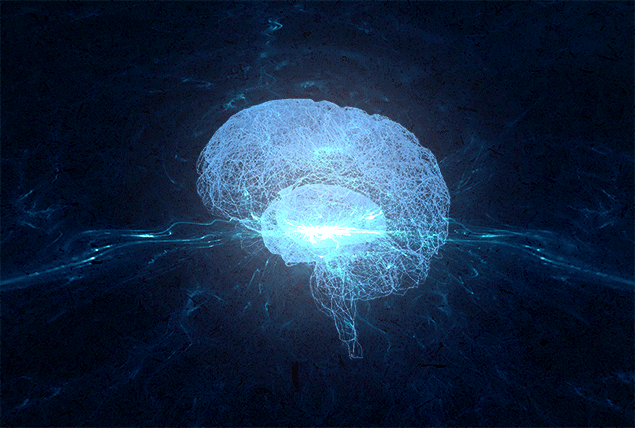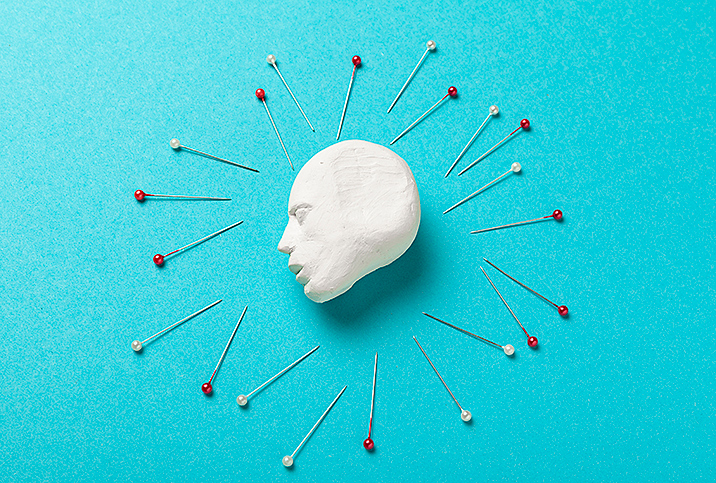Living With the Daily Impact of Migraine Disorder

If you've experienced a migraine episode, you likely know how debilitating the attacks can be. Episodes include visual disturbances, head pain, nausea, vomiting, sensitivity to light, sound or smells, and more.
These physical symptoms can be much more than a source of moderate to severe discomfort. When you're dealing with a migraine episode, you probably will struggle to function.
"Fifty percent of disability is related to being less productive," said Susan Broner, M.D., assistant professor of clinical neurology at Weill Cornell Medical College and medical director of the Weill Cornell Medicine Headache Program in New York City. "So if you think maybe I have migraine once or twice a month but they last one and a half days, you're talking about almost three weeks a year that you're not feeling well."
She pointed out that this condition tends to affect people during the most productive time of their lives. Migraine disorder most often begins when folks are in their teen years, and it persists into their 50s. As people enter their 50s and beyond, migraines tend to slow down or even disappear completely.
"When you actually delve into the disability aspect, you realize how much of the population it affects," Broner explained. "Migraine isn't just a headache. It's also associated with decreased ability to think, mood changes, being withdrawn, sound sensitivity and irritability. All those things are common symptoms. And even once the headache's gone, people can feel poorly for the next day or two."
Much of our health is impacted by a combination of biological, psychological and social factors, so it stands to reason this neurological disorder would have a ripple effect on overall health and well-being.
Let's take a look at how migraine disorder can impact specific areas of daily life, starting with sexual health.
Your romantic relationships can be affected
The Chronic Migraine Epidemiology and Outcomes study, published in 2016, was a longitudinal online study that included the input of more than 4,000 couples. Of the participants, 51.4 percent reported that migraines disrupted one-on-one time with their spouse. When partners did spend time together, more than half of them said their enjoyment of that time was significantly reduced.
Other aspects of the relationship that were negatively affected included the division of housework, the ability to engage in sexual play, and even meal planning as certain foods and beverages can trigger a migraine episode.
Regarding their sex lives, people with migraines often report greater instances of sexual dysfunction, including an inability to achieve orgasm or maintain an erection. The research on these aspects, however, remains scant and reported incidences of dysfunction may be tied more closely to the depression experienced by people with migraine disorder, rather than the actual physical symptoms of the episodes themselves.
Some studies indicate sexual activity may relieve the pain of a migraine headache, perhaps because the chemicals released during sexual stimulation and orgasm can diminish pain responses in the body.
It should be noted that some of the medications used to prevent migraine episodes can cause sexual dysfunction and decreased sex drive for both women and men, something that can occur both during and in between migraine episodes.
What's perhaps most disheartening is that 30 percent of survey respondents with migraines said their spouse didn't believe them about their headaches, while 14 percent reported that their spouse became angry or upset at them for having headaches; this rate increased to 27.5 percent for people with chronic migraines.
On a practical basis, what can you do about this?
For one, you should be honest with your partner about your experience with migraines. Many people with migraine disorder approach episodes with a grin-and-bear-it attitude since, as an invisible disorder, it can be difficult for others in their lives to truly appreciate how unpleasant and disruptive episodes are.
But our partners can't know if we don't tell them. Let them know what you're experiencing and share concrete ideas for how they might help. And above all, take care of yourself and get the treatment you need.
For partners of people with migraine disorder: Believe what they're saying and don't begrudge them because of a disorder they can't entirely control. Next, familiarize yourself with their most common migraine triggers and do what you can to help your partner avoid those triggers.
Also, categorize an issue that impacts your relationship as a couple's problem, and not just something that affects your partner. Work together to reduce its impact and keep your relationship strong.
The effect on your mental health
People with migraines also experience higher rates of anxiety and depression, Broner noted.
According to one survey of more than 6,000 participants published in 2021, people with migraines were more than twice as likely to report poor mental health as those without migraines. Another study published in 2017 indicated individuals with migraine disorder were 25 times more likely than those without migraine disorder to feel nervous or anxious on a daily basis.
Research published in 2016 indicated this relationship between mental health and migraine disorder may be bidirectional and, while this relationship is not clearly understood, it may have something to do with serotonin, a neurotransmitter in the brain that also comes into play with migraines.
"This, along with genetic and other factors, can be the reason people with migraine have a higher incidence of anxiety and depression and vice versa," Broner said.
Some treatment options to consider include exercise, relaxation techniques (including breathing exercises), improved sleep and medication. All of these can have a positive impact on not only migraine symptoms but also on mental health. Cognitive behavioral therapy can also be helpful in managing migraine triggers.
Migraines and money
It may not be apparent immediately, but considering how migraine episodes affect productivity levels, it makes sense that migraine disorder can have an adverse impact on your personal finances.
Aura affects eyesight. Head pain and "brain fog" make it difficult to concentrate. Dizziness can make certain types of work dangerous. And nausea and vomiting are obviously disruptive. In addition, the light from computer monitors can also be a migraine trigger.
One study from 2018 indicated that people with migraines missed an average of 8.9 more days of work than people who didn't have migraines. Researchers concluded that for employees with migraines, employers paid $8,924 more per year in absenteeism, healthcare spending, and short- and long-term disability. All of these factors can increase the risk of job loss.
Of course, the financial stress of losing a job or having a lower income to pay bills increases the likelihood of migraine episodes, and thus, you have the beginnings of a vicious cycle.
Comorbidity with other aspects of health
The term comorbidity refers to the statistical association of two separate diseases in one person at a rate considered higher than usual. Research indicates that many illnesses are comorbid with migraines. In addition to the aspects of health mentioned above, migraine disorder has been shown to be comorbid with:
- Chronic pain disorders
- Coronary heart disease
- Epilepsy
- Hypertension
- Irritable bowel syndrome (IBS)
- Stroke
If you do experience migraine disorder, you should let your doctor know and, together, decide the best course of action. You can always find useful resources at organizations such as the American Migraine Foundation and the National Headache Foundation.
"Migraine is a real neurological disorder," Broner reiterated. "If people are having migraine affect their lives, speaking to a healthcare practitioner about getting in control is absolutely worth it. There are treatments out there, and finding that person who's going to help you is really worth the effort."


















